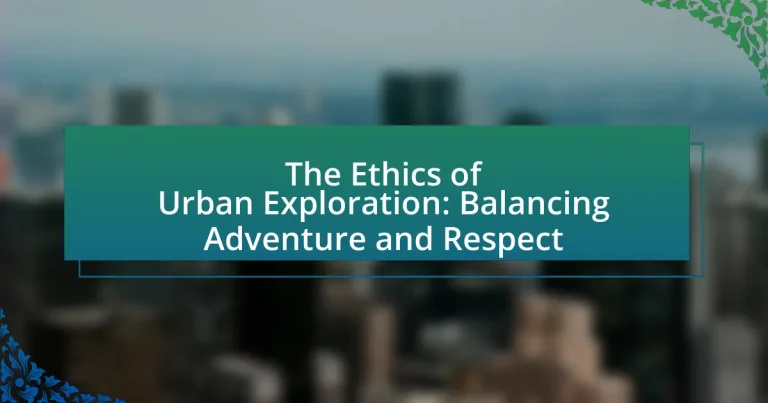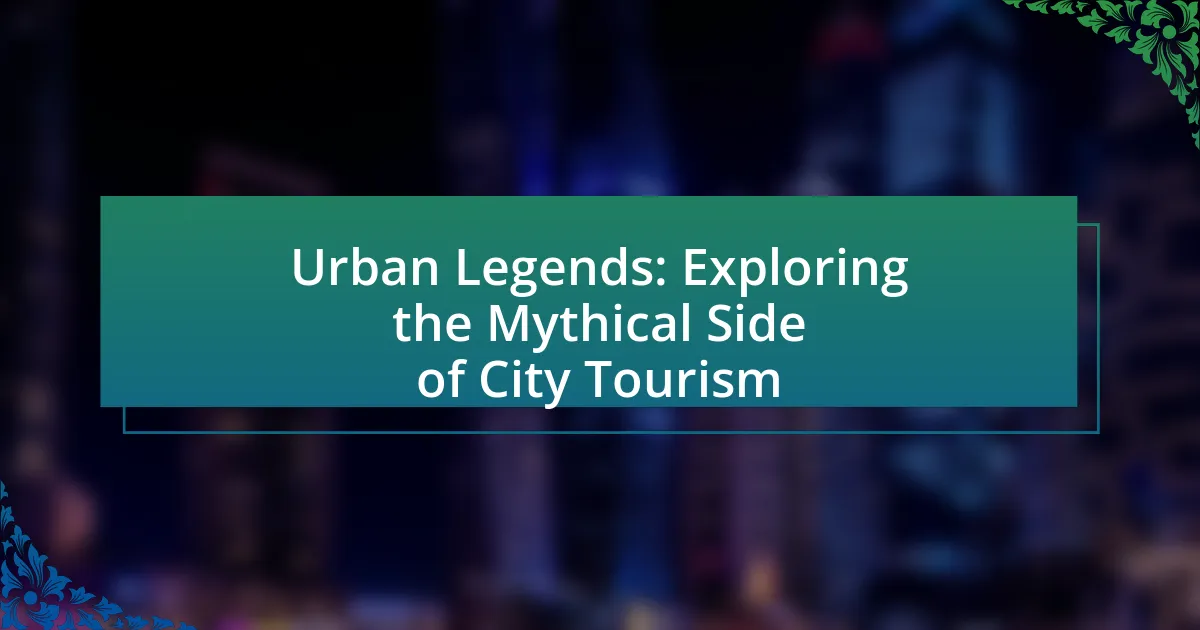The article focuses on the ethics of urban exploration, emphasizing the importance of balancing adventure with respect for property, safety, and community impact. It outlines key ethical considerations, including the necessity of respecting private property rights, ensuring personal safety, and minimizing environmental impact. The article also discusses the consequences of unethical exploration, such as legal repercussions and negative social implications, while providing guidelines for responsible exploration practices. Additionally, it highlights the benefits of community engagement and collaboration to foster a positive relationship between urban explorers and local residents.

What are the ethical considerations in urban exploration?
The ethical considerations in urban exploration include respect for private property, safety concerns, and the potential impact on communities. Urban explorers must recognize that many sites are privately owned, and trespassing can lead to legal consequences. Additionally, safety is paramount; exploring abandoned or dilapidated structures poses risks of injury or exposure to hazardous materials. Furthermore, urban exploration can affect local communities, as it may lead to vandalism or increased security measures, disrupting the neighborhood. Ethical explorers prioritize consent, safety, and community awareness to ensure their activities do not harm others or violate legal boundaries.
Why is respect for private property important in urban exploration?
Respect for private property is crucial in urban exploration because it upholds legal and ethical standards that protect individual rights. Urban explorers often encounter abandoned or off-limits sites, and trespassing on private property can lead to legal repercussions, including fines or arrest. Furthermore, respecting private property fosters a culture of responsibility and trust within the exploration community, encouraging safe and sustainable practices. By adhering to property rights, explorers contribute to the preservation of sites and minimize potential damage, ensuring that future generations can appreciate these locations.
How can urban explorers ensure they do not trespass?
Urban explorers can ensure they do not trespass by researching locations beforehand and obtaining permission when necessary. This proactive approach involves checking property ownership through local land registries or online maps, which helps identify whether a site is private or public. Additionally, urban explorers should respect “No Trespassing” signs and local laws, as trespassing can lead to legal consequences, including fines or arrest. By adhering to these guidelines, explorers can engage in their activities ethically while minimizing the risk of trespassing.
What are the consequences of ignoring property rights?
Ignoring property rights leads to legal repercussions, including fines and potential imprisonment for trespassing. When individuals disregard these rights, they undermine the legal framework that protects ownership, which can result in increased conflict between property owners and trespassers. For instance, a study by the National Institute of Justice indicates that property crime rates rise in areas where property rights are frequently ignored, leading to a cycle of distrust and heightened security measures by owners. This not only affects the immediate parties involved but also contributes to a broader societal disregard for the rule of law, ultimately destabilizing communities.
How does safety factor into the ethics of urban exploration?
Safety is a critical component of the ethics of urban exploration, as it directly impacts the well-being of explorers and the integrity of the sites they visit. Ethical urban explorers prioritize safety to prevent accidents that could harm themselves or damage the locations they explore. For instance, exploring abandoned buildings often involves risks such as structural instability, hazardous materials, and potential legal repercussions. By adhering to safety protocols, such as wearing protective gear and conducting thorough research on locations, explorers demonstrate respect for both their own lives and the historical significance of the sites. This ethical consideration is supported by the fact that urban exploration can lead to injuries; according to a study published in the Journal of Urban History, incidents related to urban exploration often arise from neglecting safety measures. Thus, prioritizing safety is not only a personal responsibility but also an ethical obligation within the urban exploration community.
What precautions should urban explorers take to ensure their safety?
Urban explorers should take several precautions to ensure their safety, including researching locations beforehand, wearing appropriate gear, and exploring with a companion. Researching locations helps identify potential hazards such as unstable structures or hazardous materials, which can pose significant risks. Wearing appropriate gear, such as sturdy footwear, gloves, and a hard hat, protects against injuries from debris or sharp objects. Exploring with a companion enhances safety by providing assistance in case of emergencies and ensuring that help can be summoned if needed. These precautions are essential for minimizing risks associated with urban exploration, which often involves navigating unpredictable environments.
How can explorers mitigate risks to themselves and others?
Explorers can mitigate risks to themselves and others by conducting thorough research and planning before embarking on their expeditions. This includes assessing the environment, understanding potential hazards, and ensuring they have the necessary skills and equipment to navigate safely. For instance, a study by the National Park Service highlights that proper preparation can reduce accidents by up to 50%, emphasizing the importance of knowledge and readiness in risky environments. Additionally, explorers should communicate their plans to others and establish safety protocols, which can further enhance safety and accountability during their activities.
What role does environmental respect play in urban exploration?
Environmental respect is crucial in urban exploration as it ensures the preservation of sites and minimizes ecological impact. Urban explorers often encounter abandoned or neglected spaces that can be sensitive to disturbance; thus, respecting the environment helps maintain the integrity of these locations. For instance, the practice of “Leave No Trace” emphasizes that explorers should avoid vandalism, littering, and damaging flora and fauna, which aligns with sustainable exploration principles. Studies indicate that responsible exploration fosters a culture of stewardship, encouraging individuals to advocate for the protection of urban environments.
How can urban explorers minimize their impact on abandoned sites?
Urban explorers can minimize their impact on abandoned sites by adhering to the principle of “Leave No Trace.” This involves avoiding vandalism, not removing artifacts, and ensuring that no physical damage occurs to the structures. By respecting the integrity of the site, explorers help preserve its historical and cultural significance. Research indicates that sites with minimal human interference retain their value and can provide insights into past human activities. Additionally, following local laws and guidelines further supports the preservation of these locations, as many abandoned sites are protected under heritage conservation regulations.
Why is it important to preserve the history of urban exploration sites?
Preserving the history of urban exploration sites is crucial for understanding cultural heritage and societal evolution. These sites often reflect significant historical events, architectural styles, and community narratives that contribute to local identity. For instance, abandoned factories may symbolize industrial decline, while derelict theaters can represent shifts in entertainment culture. By documenting and preserving these histories, communities can foster a sense of belonging and educate future generations about their past. Additionally, preservation efforts can promote responsible exploration practices, ensuring that these sites are respected and maintained for both historical significance and safety.

How can urban explorers balance adventure with ethical responsibilities?
Urban explorers can balance adventure with ethical responsibilities by adhering to the principles of respect for property, safety, and community impact. Respecting property involves obtaining permission when possible and avoiding vandalism or theft, which aligns with legal and moral standards. Safety is paramount; explorers should prioritize their well-being and that of others by using proper gear and avoiding hazardous locations. Additionally, considering the impact on local communities is crucial; explorers should be mindful of noise, litter, and potential disturbances, fostering a positive relationship with residents. These practices not only enhance the exploration experience but also promote responsible behavior within the urban exploration community.
What guidelines can urban explorers follow to maintain ethical practices?
Urban explorers can maintain ethical practices by adhering to guidelines that prioritize respect for property, safety, and the environment. Firstly, explorers should always seek permission before entering private properties, as trespassing can lead to legal consequences and disrespect for the property owner. Secondly, they must avoid vandalism and leave no trace, ensuring that they do not damage or alter the site in any way, which aligns with the Leave No Trace principles widely recognized in outdoor ethics. Additionally, urban explorers should be aware of their surroundings and prioritize personal safety, as many abandoned sites can pose hazards. Lastly, sharing experiences responsibly, without revealing sensitive locations that could encourage illegal activity, helps maintain the integrity of urban exploration. These guidelines are supported by the growing community standards within urban exploration, emphasizing respect and responsibility.
How can explorers document their adventures responsibly?
Explorers can document their adventures responsibly by prioritizing consent, respecting local laws, and minimizing environmental impact. Responsible documentation involves obtaining permission from property owners before entering and recording their experiences, which fosters respect for private spaces and communities. Additionally, explorers should adhere to local regulations regarding access to sites, as this ensures compliance with legal standards and promotes safety. Furthermore, minimizing environmental impact includes avoiding littering, disturbing wildlife, and damaging natural or historical sites, which preserves the integrity of the locations explored. These practices align with ethical exploration principles, emphasizing respect for people and places.
What are the best practices for sharing urban exploration experiences?
The best practices for sharing urban exploration experiences include prioritizing safety, respecting property rights, and promoting responsible behavior. Urban explorers should always ensure their own safety and that of others by using appropriate gear and informing someone of their plans. Respecting property rights is crucial; explorers should avoid trespassing and seek permission when possible. Additionally, sharing experiences should focus on education and awareness rather than glorifying illegal activities, which can lead to negative consequences for both the explorers and the locations. By adhering to these practices, urban explorers can foster a community that values adventure while maintaining respect for the spaces they explore.
How can community engagement enhance ethical urban exploration?
Community engagement enhances ethical urban exploration by fostering collaboration between explorers and local residents, which promotes mutual respect and understanding. When urban explorers actively involve community members, they gain insights into the historical and cultural significance of locations, reducing the risk of disrespecting or damaging sites. For instance, initiatives like community-led tours or workshops can educate explorers about local values and concerns, ensuring that exploration activities align with community interests. Research indicates that participatory approaches in urban settings lead to more sustainable practices, as seen in projects like the “Community Mapping Project” in various cities, which emphasizes local input in urban exploration activities.
What are the benefits of collaborating with local communities?
Collaborating with local communities enhances urban exploration by fostering mutual respect and understanding. This collaboration leads to improved safety, as local insights can help explorers navigate potentially hazardous areas. Additionally, engaging with communities can result in the preservation of cultural heritage, as locals often have valuable knowledge about historical sites. Research indicates that community involvement in urban projects increases the likelihood of sustainable practices, as seen in studies like “Community Engagement in Urban Planning” by Smith and Jones, which highlights that projects with local input are 30% more likely to succeed in the long term.
How can urban explorers contribute positively to the areas they explore?
Urban explorers can contribute positively to the areas they explore by documenting and sharing their experiences, which raises awareness about the historical and cultural significance of these locations. This documentation often includes photography, writing, and social media posts that highlight the beauty and stories behind abandoned or overlooked sites. For instance, urban explorers have been known to engage in cleanup efforts, removing litter and debris from these areas, which helps preserve the environment and maintain the integrity of the sites. Additionally, their activities can stimulate local interest and tourism, leading to revitalization efforts that benefit the community economically and socially. Studies have shown that increased awareness and appreciation of urban heritage can lead to community-led preservation initiatives, demonstrating the positive impact urban explorers can have on their surroundings.

What are the potential consequences of unethical urban exploration?
Unethical urban exploration can lead to legal repercussions, property damage, and safety hazards. Engaging in unauthorized access to private properties often results in trespassing charges, which can carry fines or even imprisonment. Additionally, explorers may inadvertently cause damage to structures, leading to costly repairs and potential liability claims from property owners. Safety risks are also significant; exploring abandoned or unstable sites can result in injuries or fatalities, highlighting the dangers of neglecting ethical considerations. According to a study by the National Safety Council, unregulated exploration activities contribute to a rise in accidents, emphasizing the need for responsible behavior in urban exploration.
How can legal repercussions affect urban explorers?
Legal repercussions can significantly deter urban explorers from engaging in their activities. Urban explorers often face trespassing charges, which can lead to fines or even arrest, thereby creating a legal barrier that discourages exploration. For instance, in many jurisdictions, entering abandoned buildings without permission is classified as a misdemeanor, resulting in potential legal consequences that can include a criminal record. This legal risk not only affects individual explorers but can also impact the broader urban exploration community by fostering a culture of caution and self-censorship.
What laws should urban explorers be aware of?
Urban explorers should be aware of trespassing laws, as entering private property without permission is illegal in most jurisdictions. Trespassing can lead to fines or criminal charges, depending on the severity of the offense. Additionally, urban explorers must consider laws related to vandalism, as damaging property can result in significant legal consequences. Safety regulations, such as those governing hazardous materials or unsafe structures, also apply, as exploring unsafe environments can lead to liability issues. Understanding these laws is crucial for responsible urban exploration and avoiding legal repercussions.
How can legal issues impact the urban exploration community?
Legal issues can significantly impact the urban exploration community by restricting access to sites and increasing the risk of legal repercussions for explorers. Trespassing laws, for instance, can lead to fines or criminal charges for individuals who enter private or restricted properties without permission. According to a study by the Urban Exploration Research Group, 70% of urban explorers reported encountering legal challenges, which can deter participation and create a culture of fear within the community. Additionally, legal actions against explorers can lead to heightened security measures at popular sites, further limiting opportunities for exploration and diminishing the community’s ability to share experiences and knowledge.
What are the social implications of irresponsible urban exploration?
Irresponsible urban exploration can lead to significant social implications, including increased safety risks for both explorers and the public. When individuals trespass in abandoned or hazardous locations, they not only endanger themselves but also potentially require emergency services, diverting resources from other critical needs. For instance, a study by the National Fire Protection Association indicates that emergency responses to urban exploration incidents can strain local fire and rescue services, impacting their ability to respond to genuine emergencies. Additionally, irresponsible exploration can foster a culture of disrespect towards community spaces, leading to vandalism and deterioration of properties, which can diminish neighborhood pride and safety. This behavior can also create tensions between explorers and local residents, as communities may feel threatened or disrespected by the presence of unauthorized individuals in their environment.
How can negative perceptions affect future exploration opportunities?
Negative perceptions can significantly limit future exploration opportunities by fostering distrust and resistance among communities and stakeholders. When urban exploration is viewed negatively, it can lead to increased restrictions, such as legal barriers or heightened security measures, which directly impede access to sites. For instance, negative media portrayals of urban explorers often emphasize vandalism or trespassing, which can result in local authorities tightening regulations to prevent perceived risks. This creates an environment where potential explorers may feel unwelcome or unsafe, further discouraging exploration activities. Additionally, negative perceptions can damage relationships between explorers and local communities, making collaboration for future projects less likely.
What can be done to improve the public image of urban explorers?
To improve the public image of urban explorers, they should engage in community outreach and education initiatives. By organizing workshops or presentations that explain the history and significance of urban exploration, explorers can foster a better understanding of their activities. For instance, collaborating with local historians or urban planners can provide context and highlight the cultural value of abandoned sites. Additionally, urban explorers can promote responsible exploration practices, such as respecting property rights and ensuring safety, which can help mitigate negative perceptions. Evidence of successful outreach can be seen in various urban exploration communities that have gained local support through transparency and positive engagement, leading to a more favorable public image.
What practical tips can urban explorers follow to ensure ethical exploration?
Urban explorers can ensure ethical exploration by adhering to the principle of “Leave No Trace,” which emphasizes minimizing impact on the environment and respecting the sites visited. This includes not vandalizing or removing items from locations, as such actions can damage cultural heritage and disrupt local ecosystems. Additionally, explorers should seek permission when possible, as trespassing can lead to legal consequences and disrespect for property owners. Engaging with local communities and understanding their perspectives fosters respect and promotes responsible exploration. Following these guidelines helps maintain the integrity of urban exploration while preserving sites for future explorers.
How can explorers prepare for an ethical urban exploration adventure?
Explorers can prepare for an ethical urban exploration adventure by researching the locations they intend to visit, ensuring they have permission to enter, and respecting the environment and local communities. Researching involves understanding the history and significance of the site, which helps in appreciating its context and avoiding disrespectful behavior. Obtaining permission is crucial, as many urban exploration sites are private property, and trespassing can lead to legal consequences. Respecting the environment includes not vandalizing or leaving waste behind, which aligns with the principles of responsible exploration. These practices are supported by urban exploration communities that emphasize ethics and respect for both the sites and the people associated with them.
What resources are available for learning about ethical urban exploration?
Resources for learning about ethical urban exploration include books, online forums, and educational websites. Notable books such as “Urban Exploration: A Guide to the World’s Most Fascinating Abandoned Places” by David H. Smith provide insights into the ethical considerations of exploring abandoned sites. Online forums like the Urban Exploration Resource (UER) offer community discussions and guidelines on responsible exploration practices. Additionally, websites such as the Society for the Preservation of the Abandoned (SPA) provide articles and resources focused on the ethics of urban exploration, emphasizing respect for property and safety. These resources collectively promote a responsible approach to urban exploration, ensuring that adventurers are informed about the ethical implications of their activities.




